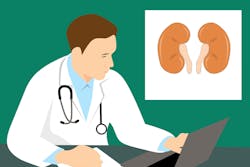Possible link between COVID-19 and chronic kidney disease
The results of a large-scale study of nearly 4,000 patients led by researchers at the Icahn School of Medicine at Mount Sinai suggest that nephrologists will need to prepare for a significant uptick in patients with chronic kidney disease, the result of exposure to the SARS-CoV-2 virus that causes COVID-19, according to a press release from Mount Sinai.
The study was published in the Journal of the American Society of Nephrology.
“We are grappling with a great deal of uncertainty as to how the virus will impact the kidneys in the long haul,” says Principal Investigator, Girish Nadkarni, MD. “We may be facing an epidemic of post-COVID-19 kidney disease, and that, in turn, could mean much greater numbers of patients who require kidney dialysis and even transplants.” Nadkarni is Co-Director of the COVID Informatics Center, Clinical Director of the Hasso Plattner Institute for Digital Health and Assistant Professor of Medicine (Nephrology) at the Icahn School of Medicine at Mount Sinai.
In the study, Nadkarni and a team of Mount Sinai researchers describe troubling consequences of COVID–19 on the kidneys, including acute kidney injury (AKI), which occurred in 46 percent of hospitalized patients, one-fifth of whom required dialysis. Most striking, in-hospital mortality was 50 percent among patients with AKI, versus 8 percent of patients hospitalized with COVID -19 who did not develop AKI. Only 30 percent of patients who were hospitalized with COVID-19 and developed AKI survived and experienced renal recovery.
The researchers conducted a retrospective observational study of 3,993 Mount Sinai Health System patients hospitalized from February 27 to May 30, 2020, reviewing data from electronic health records of patients older than 18 years with laboratory-confirmed COVID-19.
“These findings bring clinical evidence to the hypothesis of lingering organ dysfunction among patients recovering from COVID-19 and serve as a reminder to hospitals around the country to be very strategic in the allocation of resources to care for patients who experience acute kidney injury,” Nadkarni said.
While describing how the Mount Sinai Health System patient population of racially and ethnically diverse New Yorkers fared during the peak of the pandemic, the authors also show a broader picture of a city unprepared. With New York City being the early epicenter of the COVID-19 pandemic not only in the United States but worldwide, the burden of severe AKI reached full tilt. The authors describe widespread shortages of dialysis nurses, machines, replacement fluids, and cartridges for continuous renal replacement therapy and dialysis.
“The sheer number of AKI cases, and the overwhelming need for dialysis that we are seeing in the context of COVID-19, is unprecedented. These findings may help health systems prepare for the high rates of renal dysfunction in incoming COVID-19 patients,” adds Dr. Nadkarni.

